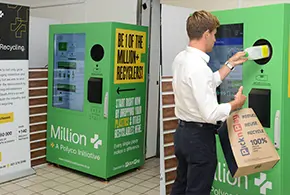Pick n Pay's Reverse Vending Machines exchange recycling for rewards
The purpose of Reverse Vending Machines (RVM) is to incentivise customers to recycle their waste in exchange for digital cash and vouchers, to drive awareness and a culture of recycling.

Pippa Hudson speaks to Wendy Knowler, Consumer Journalist.
Pick n Pay has taken another stride towards environmental sustainability by introducing a further ten more Reverse Vending Machines (RVMs) in stores across Gauteng, the Eastern, and Western Cape, which will soon be integrated with its Smart Shopper programme to reward customers with points for recycling.
Here it is, have you seen them around?

These RVMs, operated in collaboration with Polyco, currently incentivise customers to recycle their waste in exchange for digital cash and vouchers, driving engagement and a culture of recycling.
RELATED: Recycling DON’TS: Things that should NOT be in your recycling bin
Pick n Pay and some other retail stores initially piloted an RVM in 2018, and its success led to four machines becoming operational.
Since then, ten more stores have received RVMs through the Polyco partnership, and an estimated 20 more are scheduled to be rolled out through a supplier partnership mid-year.
The RVMs will be linked with the store’s Smart Shopper points, which will be introduced later in the year.
When consumers deposit recyclable materials such as plastic, glass and aluminium in the machines, they will receive rewards to spend on the Imagined Earth app with various rewards partners.
All recyclable materials can be deposited in the vending machines, provided they have a barcode to identify the product.
Each machine can store between 650 and 750 waste items or around 375 two-litre milk bottles.
The machines enable customers to be rewarded for recycling waste products, including plastic, cans, coffee cups, Tetrapak, glass and refillable items.
The rewards are determined based on the weight and type of material deposited, with prices averaging around 10c for a PET bottle, 15c for a can, and 11c for a glass bottle.
"The rewards are not huge but you get things like airtime, data, vouchers. It's putting the importance and need to recycle for the environment and because we have immense pressure on landfills and it creates job opportunities. The machines aren't big but everything in there is clean and gorgeous. There was no smell."
Wendy Knowler, Consumer Journalist